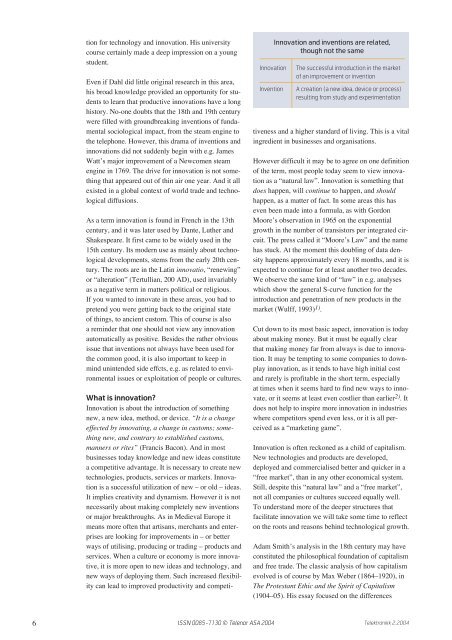Innovation Practice - Telenor
Innovation Practice - Telenor
Innovation Practice - Telenor
You also want an ePaper? Increase the reach of your titles
YUMPU automatically turns print PDFs into web optimized ePapers that Google loves.
6<br />
tion for technology and innovation. His university<br />
course certainly made a deep impression on a young<br />
student.<br />
Even if Dahl did little original research in this area,<br />
his broad knowledge provided an opportunity for students<br />
to learn that productive innovations have a long<br />
history. No-one doubts that the 18th and 19th century<br />
were filled with groundbreaking inventions of fundamental<br />
sociological impact, from the steam engine to<br />
the telephone. However, this drama of inventions and<br />
innovations did not suddenly begin with e.g. James<br />
Watt’s major improvement of a Newcomen steam<br />
engine in 1769. The drive for innovation is not something<br />
that appeared out of thin air one year. And it all<br />
existed in a global context of world trade and technological<br />
diffusions.<br />
As a term innovation is found in French in the 13th<br />
century, and it was later used by Dante, Luther and<br />
Shakespeare. It first came to be widely used in the<br />
15th century. Its modern use as mainly about technological<br />
developments, stems from the early 20th century.<br />
The roots are in the Latin innovatio, “renewing”<br />
or “alteration” (Tertullian, 200 AD), used invariably<br />
as a negative term in matters political or religious.<br />
If you wanted to innovate in these areas, you had to<br />
pretend you were getting back to the original state<br />
of things, to ancient custom. This of course is also<br />
a reminder that one should not view any innovation<br />
automatically as positive. Besides the rather obvious<br />
issue that inventions not always have been used for<br />
the common good, it is also important to keep in<br />
mind unintended side effcts, e.g. as related to environmental<br />
issues or exploitation of people or cultures.<br />
What is innovation?<br />
<strong>Innovation</strong> is about the introduction of something<br />
new, a new idea, method, or device. “It is a change<br />
effected by innovating, a change in customs; something<br />
new, and contrary to established customs,<br />
manners or rites” (Francis Bacon). And in most<br />
businesses today knowledge and new ideas constitute<br />
a competitive advantage. It is necessary to create new<br />
technologies, products, services or markets. <strong>Innovation</strong><br />
is a successful utilization of new – or old – ideas.<br />
It implies creativity and dynamism. However it is not<br />
necessarily about making completely new inventions<br />
or major breakthroughs. As in Medieval Europe it<br />
means more often that artisans, merchants and enterprises<br />
are looking for improvements in – or better<br />
ways of utilising, producing or trading – products and<br />
services. When a culture or economy is more innovative,<br />
it is more open to new ideas and technology, and<br />
new ways of deploying them. Such increased flexibility<br />
can lead to improved productivity and competi-<br />
ISSN 0085-7130 © <strong>Telenor</strong> ASA 2004<br />
<strong>Innovation</strong> and inventions are related,<br />
though not the same<br />
<strong>Innovation</strong> The successful introduction in the market<br />
of an improvement or invention<br />
Invention A creation (a new idea, device or process)<br />
resulting from study and experimentation<br />
tiveness and a higher standard of living. This is a vital<br />
ingredient in businesses and organisations.<br />
However difficult it may be to agree on one definition<br />
of the term, most people today seem to view innovation<br />
as a “natural law”. <strong>Innovation</strong> is something that<br />
does happen, will continue to happen, and should<br />
happen, as a matter of fact. In some areas this has<br />
even been made into a formula, as with Gordon<br />
Moore’s observation in 1965 on the exponential<br />
growth in the number of transistors per integrated circuit.<br />
The press called it “Moore’s Law” and the name<br />
has stuck. At the moment this doubling of data density<br />
happens approximately every 18 months, and it is<br />
expected to continue for at least another two decades.<br />
We observe the same kind of “law” in e.g. analyses<br />
which show the general S-curve function for the<br />
introduction and penetration of new products in the<br />
market (Wulff, 1993) 1) .<br />
Cut down to its most basic aspect, innovation is today<br />
about making money. But it must be equally clear<br />
that making money far from always is due to innovation.<br />
It may be tempting to some companies to downplay<br />
innovation, as it tends to have high initial cost<br />
and rarely is profitable in the short term, especially<br />
at times when it seems hard to find new ways to innovate,<br />
or it seems at least even costlier than earlier 2) . It<br />
does not help to inspire more innovation in industries<br />
where competitors spend even less, or it is all perceived<br />
as a “marketing game”.<br />
<strong>Innovation</strong> is often reckoned as a child of capitalism.<br />
New technologies and products are developed,<br />
deployed and commercialised better and quicker in a<br />
“free market”, than in any other economical system.<br />
Still, despite this “natural law” and a “free market”,<br />
not all companies or cultures succeed equally well.<br />
To understand more of the deeper structures that<br />
facilitate innovation we will take some time to reflect<br />
on the roots and reasons behind technological growth.<br />
Adam Smith’s analysis in the 18th century may have<br />
constituted the philosophical foundation of capitalism<br />
and free trade. The classic analysis of how capitalism<br />
evolved is of course by Max Weber (1864–1920), in<br />
The Protestant Ethic and the Spirit of Capitalism<br />
(1904–05). His essay focused on the differences<br />
Telektronikk 2.2004

















